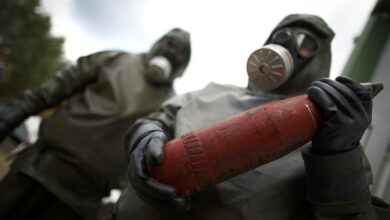
Since its 1991 independence referendum, Ukraine has battled two enemies: Russia and corruption.
The US Senate’s recent approval of $40 billion in aid to Ukraine, in addition to the $13.6 billion already provided – without conditions, sufficient oversight, or adequate consideration of the bill’s second- and third-order effects – arguably strengthened the country’s hand against the Russians, while diminishing its ability to fight corruption.
A proposed amendment for improved oversight through a Special Inspector General for Ukrainian Military, Economic, and Humanitarian Aid was defeated. The White House, along with many members of Congress, insists that review processes are sufficient to ensure the money is spent for its intended purpose. But if recent history teaches us anything, it is that the oversight programs in place do not function well.
A brief review of the last 20 years shows that time after time, existing internal review processes provide no reliable means of holding people and organizations accountable, even with quarterly reports on waste, fraud, and abuse.
The Middle East Track Record
Since 9/11, US goals in the Middle East have been ambitious. Washington spent $8 trillion on efforts to fight enemies and stabilize governments in Afghanistan, Iraq, Syria, and other countries.
Over 20 years, $73 billion in aid went directly to the Afghan military, while the country received nearly $150 billion in non-military assistance.
The Special Inspector General for Afghanistan Reconstruction issued his final report in August 2021, describing the effort as a failure.
He concluded, “By spending money faster than it could be accounted for, the US government ultimately achieved the opposite of what it intended: it fueled corruption, delegitimized the Afghan government, and increased insecurity.”

Similarly, the Special Inspector General for Iraq Reconstruction concluded that the US had spent too much money in Iraq: $60 billion to stabilize and rebuild the country after 2003. Much of it was wasted, with far too few results.
In Syria, one of the more stunning wastes of money was the Train-and-Equip Program, a $500 million effort to recruit 15,000 moderate Syrians and train them to fight ISIS.
Ten months after the program was launched, the then-commander of US Central Command, General Lloyd Austin, revealed that only about four or five US-trained rebels were deployed and fighting ISIS.
America’s inability to achieve peace and stability in the Middle East should serve as a caution to those eager to send billions to Ukraine.
Our well-reasoned, even noble, foreign policy goals have remained unmet, but our efforts are thwarted by billions of wasted or stolen dollars. Worse still, virtually no one has been held accountable.
Ukraine: Support but Verify
Since gaining independence from the former Soviet Union, Ukraine has made great strides in stamping out its legacy of corruption. Nonetheless, according to the 2021 Corruption Perception Index, Ukraine is the second-most corrupt country in Europe, behind only Russia.
With a trove of Soviet weapons at its disposal, it became notorious for illegal arms trafficking. A May 14 article in The Washington Post questioned the US government’s ability to keep track of all the missiles, rockets, artillery, and drones it was preparing to send into the country.
Not many Americans are aware that before the Russian invasion, the Ukrainian government’s efforts to root out endemic corruption were stalled – and along with them, President Volodymyr Zelensky’s public approval, which stood at just 31 percent.

The invasion, and Zelensky’s bold leadership, have galvanized popular support for the government. But when the war ends, it seems likely that Ukrainians will be quick to lose faith if there are no continuing reforms.
There have been noteworthy successes in the Ukrainian reform movement. The administration digitized company registrations, real estate ownership, and state purchasing information, and required public servant asset declarations, all of which can now be viewed by the public.
More importantly, Ukraine became the first country to set up a national database of “politically exposed persons,” or people who may be susceptible to bribery, corruption, or other money-laundering offenses. The registry is a key tool for investigating suspicious transactions. At the beginning of 2022, it contained the names of close to 50,000 individuals and 30,000 affiliated legal entities.
Future Foreign Aid
The war has derailed these reform efforts. Future foreign aid should be contingent on continuing projects such as these and should have specific set asides to encourage other transparency initiatives.
The Ukrainians are in a shooting war, and while we may not be able to exercise due diligence in the heat of battle, nothing precludes the US and its allies from building the oversight mechanisms that will be needed in the months and years ahead.
We must insist that efforts to reform the judiciary and privatize the thousands of state-owned companies be restarted as part of any reconstruction program.
Foreign aid alone cannot be expected to rebuild the country. Private-sector investments are critical, but they will not be forthcoming until corporations are confident they are entering a free marketplace that embraces the rule of law.

Given Ukraine’s unfortunate legacy of Russian-style corruption, the rapid infusion of large amounts of poorly regulated money is a prescription for disaster. While supporting Ukraine’s internal reforms, the United States needs to build robust anti-corruption capabilities designed to monitor where and how foreign aid flows.
These capabilities should include a Special Inspector General for Ukraine and the establishment of an interagency task force to monitor all facets of the aid programs. Their oversight should be equally thorough, be it in the Ukraine or inside the Beltway.
We can’t continue to ignore the role the US government has played in the foreign policy failures of recent decades. Many of those who engineered these failures not only still have their jobs, but have been promoted. Given the ability to do so, they will turn Kyiv into another Green Zone.
The outcome of the war in Ukraine has implications for all of Europe, NATO, and the world at large. This is a pivotal moment not only for the Ukrainians but also for the US. The stakes in Ukraine are too high: We can’t afford to squander billions, risk derailing the Ukrainians’ reform efforts, embolden Russian aggression, and weaken the Atlantic Alliance.
The heroic Ukrainian people have shown they have what it takes to win the battle against Russia. The United States cannot shirk its responsibility to aid them in defeating their other enemy: corruption.
 Dominique L. Plewes (@DomLPlewes) is a special advisor to the Freedom Research Foundation and founder of 501(c)3 Special Operations Forces (SOF) Support Foundation, dedicated to educating Americans on the purposes and uses of our special operations forces.
Dominique L. Plewes (@DomLPlewes) is a special advisor to the Freedom Research Foundation and founder of 501(c)3 Special Operations Forces (SOF) Support Foundation, dedicated to educating Americans on the purposes and uses of our special operations forces.
The views and opinions expressed here are those of the author and do not necessarily reflect the editorial position of The Defense Post.
The Defense Post aims to publish a wide range of high-quality opinion and analysis from a diverse array of people – do you want to send us yours? Click here to submit an op-ed.










